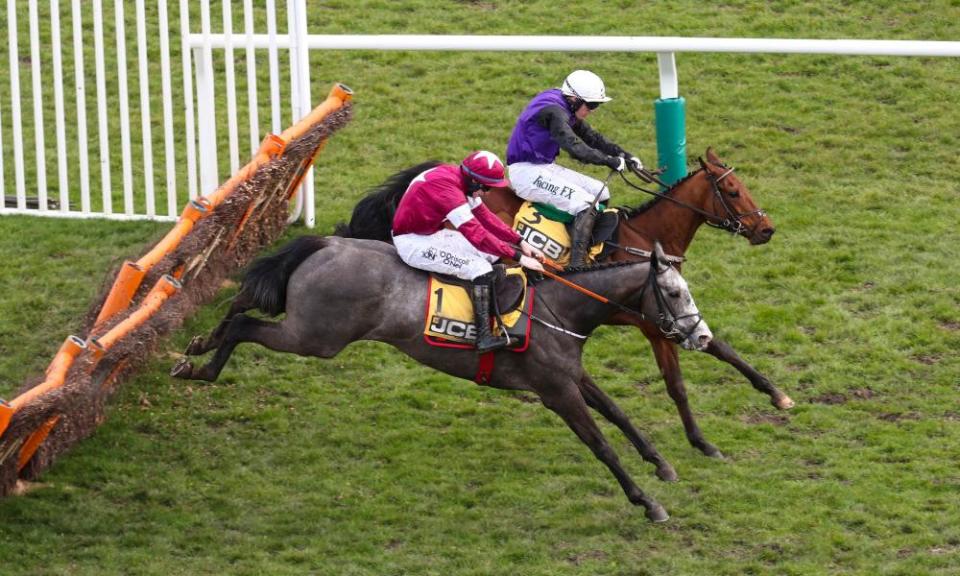Irish excellence at Cheltenham a cause for celebration not protection

As if another thumping return from Cheltenham and then the Six Nations grand slam were not enough for fans of Irish sport, the peevish reaction by at least a few on the British side to the 17-winner haul at the Festival last week must have been the cherry on top.
Britain’s National Hunt fraternity did at least lead the Irish after Summerville Boy’s win in the opener on Tuesday, but the meeting then turned into a private battle between Gordon Elliott and Willie Mullins, with the former emerging as the leading trainer with eight wins to seven. By the final afternoon, the rout was so complete that one British Horseracing Authority executive muttered darkly that “barriers” might be required in our post-Brexit future to keep the Irish in check.
This suggestion seems to have been followed by 24 hours of behind-the-scenes diplomacy between the BHA and its Irish counterpart, which has been duly reassured that there is no chance that access to the Festival will ever be denied to a horse that is good enough to compete, and certainly not on the basis of where it happens to be trained.
READ MORE: Native River prevails in Cheltenham Gold Cup duel
READ MORE: Irish dominate on St Patrick’s Thursday at Cheltenham
Naked protectionism of that sort is a terrible idea for any number of reasons, not least because it would fly in the face of the BHA’s stated policy of seeking to maintain free movement of horses post-Brexit. It would make a mockery of the Festival’s cherished status as the Olympics of jump racing, which is fundamental to its success.
And it would logically lead to tit-for-tat responses from other major racing nations in Europe, in solidarity with their fellow EU member. I’m sorry, Mr Gosden, but you can’t run your Derby winner in the Arc because our jumps trainers took an almighty kicking from the Irish at Cheltenham. It is, clearly, a nonsense.
What should also be stressed, of course, is that talk of barriers and level playing fields – another odd complaint when Cheltenham is an away fixture for the Irish – was heard only from a very small minority of those in attendance last week.
Punters and racegoers are well aware that finding winners at the Festival is difficult enough without allowing petty nationalism to get in the way. And they are there to admire the very best jumping horses, never mind where they are trained.
It is the same on both sides of the Irish Sea, and I can still remember the rapturous reception for Jodami at Leopardstown after his third successive win in Ireland’s Gold Cup in 1995. Jodami was the embodiment of the strong, brave, bold-jumping chaser that all National Hunt fans adore, and it did not matter one jot that he was trained in Yorkshire. Similarly, tens of thousands of British racegoers have joined the acclaim for horses such as Moscow Flyer, Istabraq and Hurricane Fly at Cheltenham over the past 20 years. The relative lack of nationalism in jumping is, in fact, one of its great joys.
And the bad news for those mean-spirited enough to complain about Ireland’s dominance is that they can expect to whinge their way through Festival week for some time to come. Wealth and power in jumping have become concentrated in an ever-decreasing number of hands in recent years, and a big chunk of it is being invested, and reinvested, in Ireland, even by British-based owners like Rich Ricci and Graham Wylie.
Ireland acquires the lion’s share of the best jumping prospects, and an ever-increasing number of Festival winners is an almost inevitable result.
Some suggest that it is all part of a cycle, and that it will turn again in Britain’s favour soon enough. Yet when Ireland’s share of the winners is plotted as a percentage, to take account of the increasing number of races at the Festival, the trend has been upward since the mid-90s and the Ryanair tycoon Michael O’Leary’s immense investment over the past 15 years has been a particularly significant factor.
For as long as O’Leary remains involved, and unless British jumping can find a billionaire or two who are able to compete with him, Ireland’s pre-eminence at the Festival is likely to endure. And O’Leary’s – and Ireland’s – passion for Cheltenham will also ensure that for four days in March, the best jumping horses in Europe will be in the West Country and a quarter of a million spectators will be there to celebrate them, rather than fret about their country of origin.

 Yahoo Sport
Yahoo Sport 





































